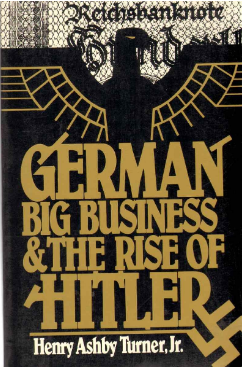--Henry Ashby Turner Jr., German Big Business and the Rise of Hitler (New York: Oxford University Press, 1985), 278-279.
Showing posts with label German Big Business and the Rise of Hitler. Show all posts
Showing posts with label German Big Business and the Rise of Hitler. Show all posts
Saturday, March 23, 2019
The NSDAP's anti-Papen Stance Set Loose a Torrent of Anti-Capitalism; Papen Was Accused of Supporting "Manchestertum" (a Derisive Term for Laissez-Faire)
The NSDAP's anti-Papen stance quickly put it on a collision course with big business, as the party's assault on the chancellor and his cabinet set loose a torrent of Nazi anti-capitalism. On the very day of the no-confidence vote and dissolution, the Nazis launched an abrasive election campaign that left no doubt about their decision to resort to demagogic socio-economic radicalism. To open the campaign, they had ready for release that day a pamphlet that branded as reactionary both Papen and his cabinet. The chancellor had, it charged, aligned himself completely with the "private capitalistic system" by issuing emergency decrees that "lacked any spark of social justice." The pamphlet pilloried the cabinet's efforts to reduce wages and undermine the sanctity of contract wages, pledging the NSDAP to resist both. It described Papen's reductions in social benefits as "social robbery" perpetrated against "the mass of working people" in order to bestow a gift on a "small gang" of big business entrepreneurs. Papen's close and one-sided ties with the business community revealed, the pamphlet announced, that his entire economic policy amounted to nothing more than a throwback to Manchestertum (a derisive term for laissez-faire economic policies) designed to fill the bank accounts of those "gentlemen."
--Henry Ashby Turner Jr., German Big Business and the Rise of Hitler (New York: Oxford University Press, 1985), 278-279.
--Henry Ashby Turner Jr., German Big Business and the Rise of Hitler (New York: Oxford University Press, 1985), 278-279.
On Hitler's Economics: Hitler Repeatedly Showed Himself Incapable of Accepting Even the Simplest Fact of Economics, the Scarcity of Goods
With Hitler, it is misleading to speak of economic thought in the usual sense. Although his acquisition of dictatorial authority over one of the most advanced industrial nations of the world eventually forced him to grapple with concrete economic problems for more than a decade, often with remarkable success, he never attained even a basic grasp of the formal discipline of economics. From the testimony of those who served him, as well as from his own writings and recorded utterances, it is obvious that he knew virtually nothing about micro-economics and had no more grasp of macro-economics than could be gained by reading newspapers. Once in power he repeatedly showed himself incapable of accepting even the simplest fact of economics, the scarcity of goods.
--Henry Ashby Turner Jr., German Big Business and the Rise of Hitler (New York: Oxford University Press, 1985), 71.
--Henry Ashby Turner Jr., German Big Business and the Rise of Hitler (New York: Oxford University Press, 1985), 71.
Subscribe to:
Posts (Atom)

